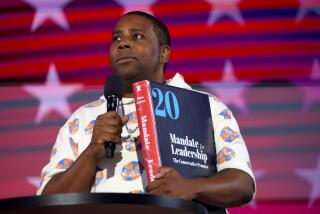Is Bush Conservative Enough?
Just how conservative is the Bush administration? This is a question liberals have no trouble answering. They point to many items on an agenda long associated with the activist wing of the Republican Party: a parade of ideologically driven judicial nominees, a tax plan that rewards the rich even as the working poor are being lopped off employment rolls and, above all, a go-it-alone America-first foreign policy.
But one notable group of critics has serious doubts about the administration’s commitment to conservative ideals: American conservatives. For months now, a chorus on the right, growing in volume and clarity, has been challenging the White House’s motives and aims. You can hear it in the pages of the American Conservative, Patrick Buchanan’s new magazine. Its critiques of the Bush administration’s overseas adventurism and “Wall Street socialism” have sharpened with each issue.
You can hear it too in the back and forth on the conservativenet listserv, an Internet discussion group in which scholars, most of them conservatives and many of them historians, have been dissecting the philosophical foundations of policymakers in the Bush administration who seem wedded to an American gigantism starkly at odds with the movement’s core principles.
And I got an earful of it this spring when I spoke to 150 members of the Intercollegiate Studies Institute -- a national organization of student conservatives who immerse themselves in classic political and philosophical writings.
The war in Iraq was going well. And they were pleased. But they wondered why some conservatives, like the editors of the Weekly Standard, were squelching debate about the war and throwing around scare words like “appeasement.”
What alarms these conservatives, young and old, is not so much the specific policies of the Bush administration as its appetite for an ever-enlarging, all-powerful government, a post- 9/11 version of statism, the bete noire of conservatism and the subject of one of the movement’s founding texts, Albert Jay Nock’s “Our Enemy, the State.”
Published in 1935, this manifesto analyzes centralization in the federal government under President Franklin D. Roosevelt, with its expanding bureaucracies and new entitlements. In Nock’s view, the New Deal bore disturbing resemblances to new dictatorships arising overseas. The connection seemed remote, because FDR was so genial and because Americans were “the most un-philosophical of beings,” immune to doctrines of the kind espoused by Hitler, Stalin and Mussolini.
But Americans suffer from a different weakness, Nock said. Our national temper is that of “an army on the march.” Susceptible to grandiose crusades, we respond with emotion rather than thought and are easily swayed “by a whole elaborate paraphernalia of showy etiquette, flags, music, uniforms, decorations and the careful cultivation of a very special sort of camaraderie.”
Nock had in mind World War I -- a war he opposed. But his description also applies to the mood created by the Bush administration since 9/11.
The ringing call for an all-encompassing yet ill-defined war on terror; the paraphernalia of a massive new Homeland Security Department; the showy drama of the president’s Hollywood-style landing aboard the U.S. carrier Abraham Lincoln; the decorative images of Bush’s features framed against the rocky visages on Mt. Rushmore -- all of it backed by stern reminders from the White House that criticism of administration policies may undermine our camaraderie, our national zeal.
For the moment, few elected conservatives seem concerned about Bush-style statism. There have been some grumblings about the ballooning budget, larded with entitlements. But most point contentedly to the president’s handsome poll numbers and to the satisfying results of the off-year elections.
But modern conservatism, at its most serious, never tied itself to party loyalty. On the contrary, as the postwar movement took shape, conservative intellectuals were as tough on Republicans as on Democrats.
National Review, the magazine William F. Buckley Jr. started in 1955, was formed partly to organize resistance to Dwight Eisenhower, the first Republican to occupy the White House since Herbert Hoover.
A hero of the right like Ohio Sen. Robert Taft was a powerful legislator but constantly battled with his party’s own establishment -- and as a result was repeatedly denied the presidential nomination.
And today, middle-aged conservatives fondly recall the 1976 presidential campaign and how the insurrectionist Ronald Reagan, the sworn enemy of Washington politics, nearly wrested the nomination from the moderate incumbent Gerald Ford.
These same conservatives are well aware that the current administration boasts holdovers from the Ford years, most prominently Dick Cheney and Donald Rumsfeld. This alone invites suspicion. Not because Ford Republicans aren’t “real” Republicans but because Cheney and Rumsfeld have been comfortably perched for many years now within the Beltway establishment -- “the imperial bureaucracy,” as Nock called it.
And Nock’s brand of conservatism, rooted in ideas and fiercely contrarian, fears most the “monocrat” at home in either party.
“The exercise of personal government, the control of a huge and growing bureaucracy and the management of an enormous mass of subsidized voting-power,” Nock wrote, “are as agreeable to one stripe of politician as they are to another.”
These are words some conservatives are pondering today as they observe an administration that is avowedly Republican but is not, perhaps, truly conservative -- at least not if judged by the lights of the movement that did so much to revitalize American politics during the last 50 years.
More to Read
Get the L.A. Times Politics newsletter
Deeply reported insights into legislation, politics and policy from Sacramento, Washington and beyond. In your inbox three times per week.
You may occasionally receive promotional content from the Los Angeles Times.










